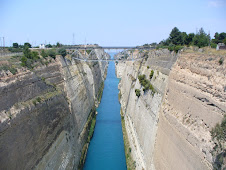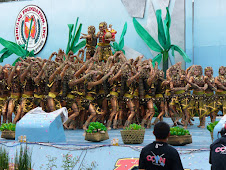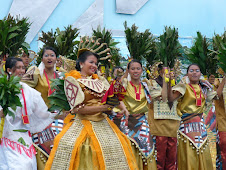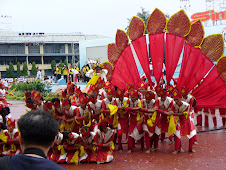Conjectures of a Pensive Bystander on the Sinulog Celebrations
I write from Cebu, now caught in the frenzy of Sinulog fever! Preparations are under way for the greatest event of the year at the center of the nation-wide celebrations and fanfare associated with the Feast of the Santo Nino, the Holy Child Jesus.
Last New Year’s eve, there may have been fewer firecrackers (the explosions and colors bursting up in the skies lasted a mere 15 minutes, at the most, in most places), and thus, fewer wounded revelers, fewer fireworks, and fewer noise and mirth-making, but you can’t take it away from the Filipino to celebrate all the same. With or without explosions and fireworks galore, the Filipino can – and does – celebrate with more than just panache and passionate dedication.
Just look at the heavy turn-out of so-called “devotees” to the Senor Nazareno, the Black Nazarene of Quiapo, January 9 last! Organizers and kibitzers alike were right in predicting a more than normal outpouring of people. A whopping 3 million people were expected! They were wrong by only a few hundred thousands. A total of 2.6 million came to join the festivities, leaving behind a total of 14 truckloads of trash the morning after. Funny, but the devotees go by the appellation as people with “panata” – a Tagalog word that means a vow, a promise, a pledge to the Black Nazarene, to passionately and personally be there during the most-awaited procession en masse, en grande, en tout cas, une merveille touristique! Vraiment! Sans doute! Not exactly sans souci, and neither an activity done with a lot of sang froid! No … there is a lot of passion put into it, a lot of emotions ran thick in the hearts and veins of all those whose dream in life is to go there and touch that blessed rope that gave them instant connection to the Nazarene. No … this time, I don’t agree with Miguel de Unamuno, who once wrote, that “if a man says he loves God, yet has no red blood of passion flowing through his veins, he only loves the God-idea, not God himself.”
Allow me to explain tout suite … the 2.6 million who came armed with panata (does it make you wonder that it sounds almost like fanatic?) didn’t do that with an air of sang froid. They weren’t there only for a walk in the park. They weren’t there only to sip cool drinks and watch the world go by placidly. No … they were there with red blood flowing through their veins. They were there filled with a lot of love and passion. They were there on the strength of a personal promise to the Lord Nazarene, never mind if that promise holds good only for the 9th of January, never mind if all the rest of the year, that panata never crosses their minds as they go through their work-a-day life in a world filled with so much “sweat and care and cumber; sorrows passing number.”
The beauty and the tragedy of the Filipino soul … the beauty of a people so blessed, so loved by a God of promises, and a God of fulfillment … the beauty of a people so easily taken in to anything remotely related to a God who came in flesh, a God incarnate in Jesus Christ, present, here, now, there, all ways, all days and for always.
But the feast of the Black Nazarene, and together with it, the noisy and raucous feast of the Santo Nino, also exposes the soft underbelly of the seeming tragedy of the Filipino soul, so caught up in the shallow, superficial world of fiestas that are celebrated with absolute panache and revelrous abandon … sans souci … sans doute … sans penser a tous lesquels s’agiront cette devotion, cet amour, et tous ces emotions!
What does all this revelry mean for us as a people?
Two and a half years before national elections, the fiesta atmosphere has begun. The Olympics that happens every 3 or 6 years in the Philippines, otherwise known as local or national elections, have come to full swing. The campaign season has begun. The most talked about word in the Philippines as of this time is the word that has become, at least for me, addiritura, una parolaccia, is “re-election.” Pundits and lawyers are having the time of their lives debating on what it means, and whether or not that most famous convict who never served time, could really run again for office.
I live in a country of fiestas, sinulogs, ati-atihan, Nazarenos, imahens, and countless Milagros! I live in a country described by the most hated writer 20 years ago, James Fallows, as a “damaged culture.” I live in a beautiful country, populated by beautiful people, but deeply immersed in a culture of corruption, a culture of politics that has become, a big structural evil.
I live in a country different from the country I was born in. When I was born, I would like to think, that there was more civility, more honesty, more dedication to good, old, hard work, and more national self-respect and international respectability. Alas, all that seems to have gone down the drain much too fast.
I am preaching a series of retreats while here, caught up in the sinulog fever in Cebu. I am awed by the genuine devotion of so many, who take part in the prayers and the liturgical celebrations that abound in the center of it all. I marvel at what Cebu becomes during Sinulog time, a haven for foreigners, gawkers, kibitzers, devotees, panata armed hordes and fanatics alike, who are out to make the day a real religious one – for whatever it is worth.
I preach to a group of unheralded heroes who do not make it to Sun Star Cebu, nor make it to the headlines. I preach to a group who has taken it their lifetime mission to take care of whom society ignores, and looks down on – the mentally sick, the psychically infirm. My duty is to explain to them their General Chapter documents, their tradition, their culture. They gave me half a dozen books to study (in Italian and Spanish and English). I fell in love with their Founder long ago, in an earlier retreat preached to the same group in Manila. I fell in love with one of their beautiful, soul-stirring document entitled “pastoral en el mundo de sufrimiento psiquico.”
And what I fell in love with, I share today. We live in a world that PCP II calls a world of “lights and shadows.” We are a land and people filled with beauty and tragedy. We live in a world of pain, of suffering, of problems many of them self-inflicted courtesy of a “damaged culture” and a political system gone wild, gone sinful, and raving mad – a structural evil, no less.
But as the Sisters’ document teaches, “somos llamados a celebrar en tierra de sombras.” We are called, as Christian believers, to a life of celebration in a world filled with all sorts of shadows. A pesar de todas las tinieblas … a pesar de todas las sombras, nosotros creyentes Cristianos, podemos celebrar sin prenos, sin preoccupaciones, porque el Senor, El ama a nosotros sin frontieras.
Having taught social theology for so long, this document of these unheralded heroes who work quietly a pesar de todo, convicts me and reminds me of what I have talked of so often, so passionately, and yet only half-convincingly: “We live in the worst of times. We live in the best of times.” (PCP II) But only if we are willing to make these times into kairos … God’s time, God’s own sweet, good time. In His time, He makes all things beautiful, in His time … In the meantime, it is good to remember that “somos llamados a celebrar en esta tierra de sombras” …. We are called to celebrate in a world filled with shadows.
Pit Senyor! Hala Bira!
Fr. Chito Dimaranan, SDB
Maria Josefa Recio Therapeutic Center
Talamban, Cebu City, Philippines
January 18, 2008
Subscribe to:
Post Comments (Atom)













No comments:
Post a Comment